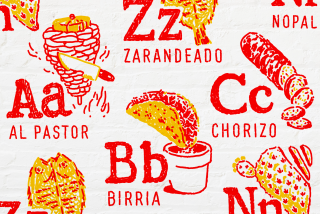Chili or Chile? Dispute Never Seems to Cool Off
- Share via
LAS CRUCES, N.M. — Chili vs. chile.
The war over how to spell New Mexico’s most valuable vegetable crop continues to rage for the head of the Chile Pepper Institute at New Mexico State University.
Paul Bosland, director of the institute and the school’s chief chile breeder, has been trying for years to get everyone to spell chile--the hot peppers or the plant from which the peppers come--with an “e.” He says chili--the spicy dish of meat and sometimes beans--should be spelled with an “i.”
“A lot of people argue about it,” he said.
The professor reasons that when people ask for the powdered pod, they get chile powder. If they want a bowl of chili, they get a chili powder--a packet of dried spices, including garlic and chile.
The word chile originated from the Aztec word “chil,” meaning pepper. Bosland said the Spanish added an “e” to the end of the word to make it a noun in their language.
Advertisements lining the back roads in the lower Rio Grande Valley, where most of New Mexico’s peppers are grown, spell it chile. Just across the border in Texas, restaurants advertise their state dish as “chili.”
Bosland has heard quite a few arguments against the New Mexico way of spelling chile.
“One person said you can’t use c-h-i-l-e because that’s the name of a country. That’s true, but Turkey seems to have done quite well,” he said. “Some say the English spell it c-h-i-l-l-i. Well, they also spell color with a “u.”
Webster’s Dictionary helps to complicate the matter. It provides three spellings--chili, chile and chilli--that are all defined as either hot peppers or a dish of meat and spices.
The Associated Press uses chili. Norman Goldstein, AP Stylebook editor, says the “i” spelling is more commonly used in most other parts of the nation.
The Los Angeles Times spells the vegetable “chile” and the spicy soup “chili.” The sauce made of chile, onion and tomato? Chile sauce.
More to Read
Sign up for Essential California
The most important California stories and recommendations in your inbox every morning.
You may occasionally receive promotional content from the Los Angeles Times.










